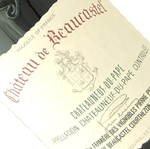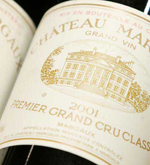Wines Italians
What follows is a very non-exhaustive list of the more common types of Italian wine you're likely to encounter.
- Chianti (Tuscany) Chianti is a Sangiovese-based red wine and is easily the best known wine of Italy. The region of Chianti is broken down into several subregions; the best known are Chianti Classico (supposedly the best and most traditional) and Chianti Rufina. The winemaker's consortium in Chianti uses a black rooster sign as a symbol of quality, so you should look for it. Chianti that is labelled as "Reserva" must have been aged at least three years.
Brunello di Montalcino (Tuscany) Brunello is a Sangiovese variant that is grown in Montalcino. This wine must be aged a full four years to qualify (five for Reserva).
Vino Nobile di Montepulciano (Tuscany) This "Noble Wine of Montelpulciano" is a blend of several grapes, of which Sangiovese is dominant.
Barolo (Piedmont) This wine, made entirely from Nebbiolo, is a very rich and complex red wine, if occasionally too tannic and astringent. The Barolo region is tiny.
Barbaresco (Piedmont) More Nebbiolo-based wine, and a bit more balanced and harmonious than Barolo. The Barbaresco region is also tiny.
Moscato d'Asti (Piedmont) This is a very light (6% alcohol), slightly effervescent white wine from the Asti region, made from Moscato grapes. It's more a fun party wine than a stern and serious wine. I've been using this as a "gateway wine" for people who claim to not like wine; invariably, they like this one and that gets them started on the path to oenophilia.
Asti (Piedmont) This is sparkling wine from Asti made from Moscato. It is made sweeter than French Champagne. You may also see this called Asti Spumante or just Spumante
Soave (Veneto) Created in Venice (well, near Venice) from Trebbiano and other grapes, this white wine has a more floral fragrance and is one of the most popular Italian export wines.
Pinot Grigio (mostly Northern Italy) This varietal produces a light, dry white wine. It is also known as Pinot Gris, and is widely grown outside Italy (especially California) because it has a cool name.
Barbera (mostly Piedmont and Lombardy) A medium body, fruity red wine
Super-Tuscan (Tuscany) This is nontraditional red wine made in a more international style (bigger and more forward), often from a blend of several varieties including Sangiovese and Cabernet Sauvignon. While some of these wines are of top international quality, they cannot qualify for DOC or DOCG designation because they operate outside the rules









